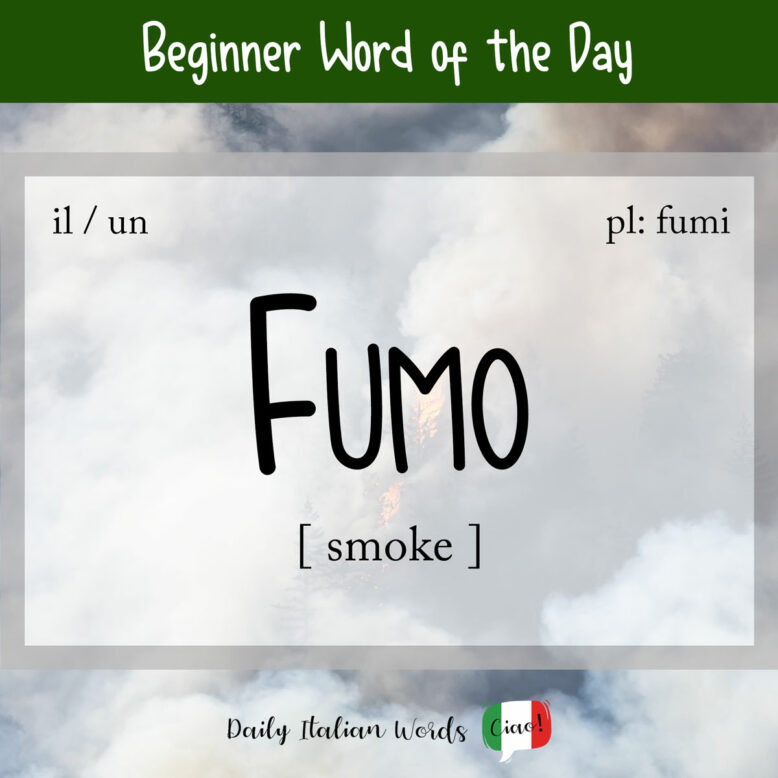The Italian word for smoke is fumo (masculine, plural: fumi). If you have trouble remembering this word, I’ve found that it helps to think of the English term fume which shares the same origin.

Related to fumo is the verb fumare which means to smoke in both the transitive and intransitive sense of the word. For example:
- L’uomo sta fumando una sigaretta. = The man is smoking a cigarette. (transitive – takes a direct object)
- Il motore sta fumando. = The motor is smoking. (intransitive – does not take a direct object)
You can also say fare fumo or emettere fumo (to smoke, to emit smoke) but keep in mind that these expressions can only be used in the intransitive sense.
L’automobile sta emettendo fumo nero dall’impianto di scarico.
The car is emitting black smoke from the exhaust system.

Another way of saying to smoke when talking specifically about cigarettes is avere il vizio del fumo / di fumare (lit: to have the bad smoking habit).
Below are a few common types of smoke which, like it or not, we encounter in our day-to-day lives:
- fumo di / della sigaretta = cigarette smoke
- fumo del tabacco = tabacco smoke
- fumo del sigaro = cigar smoke
- fumo passivo = second-hand smoke
- fumo del camino = chimney smoke
Fumo is used in a surprising number of figurative expressions in Italian including:
- vendere fumo (lit: to sell smoke) = to deceive, to try to appear different to how you really are
- mandare in fumo (lit: to send in smoke) = to cause something to fail (a project, someone’s hopes, etc.)
- andare in fumo (lit: to go in smoke) = to vanish, to go up in smoke
- essere tutto fumo = (lit: to be all smoke) = to be all show
It may also be used to talk about any gas emission that looks similar to smoke such as, for example, steam (vapore).

In its plural form «fumi», it can be used to describe a state of mental confusion, often caused by excessive alcohol consumption, intense excitement or violent passion.
Era preso dai fumi dell’alcol.
He was carried away by the alcohol.
Expressions featuring the word ‘fumo’
Tutto fumo e niente arrosto
Literal meaning: all smoke and no roast
English translation: all talk and no action
Non c’è fumo senza arrosto
Literal meaning: there’s no smoke without roast
English translation: where there’s smoke there’s fire
Essere come il fumo negli occhi
Literal meaning: to be like smoke in the eyes
English translation: to be unpleasant, detestable
Gettare fumo negli occhi (di qualcuno)
Literal meaning: to throw smoke in someone’s eyes
English translation: to pull the wool over someone’s eyes
Heather Broster is a graduate with honours in linguistics from the University of Western Ontario. She is an aspiring polyglot, proficient in English and Italian, as well as Japanese, Welsh, and French to varying degrees of fluency. Originally from Toronto, Heather has resided in various countries, notably Italy for a period of six years. Her primary focus lies in the fields of language acquisition, education, and bilingual instruction.


